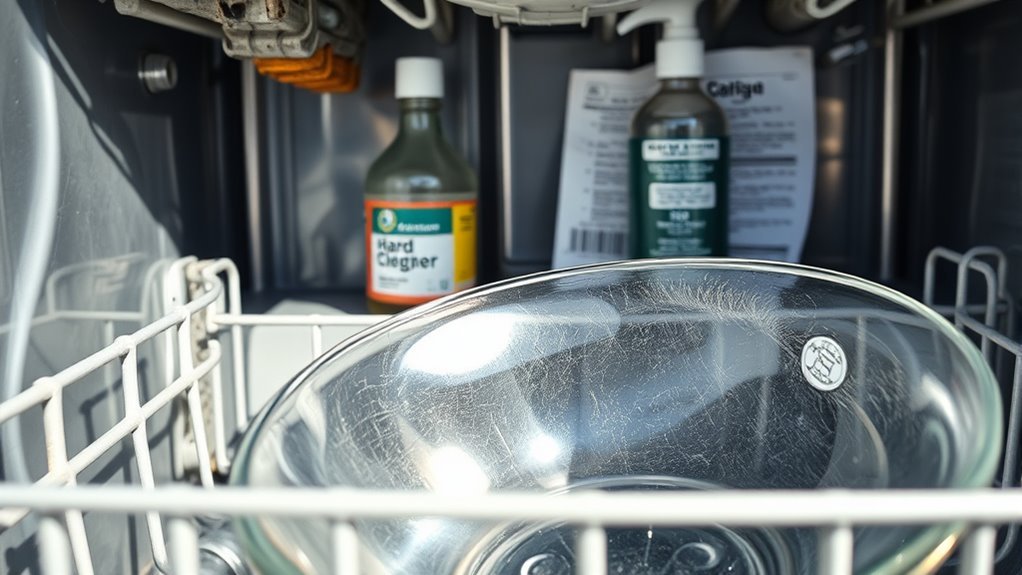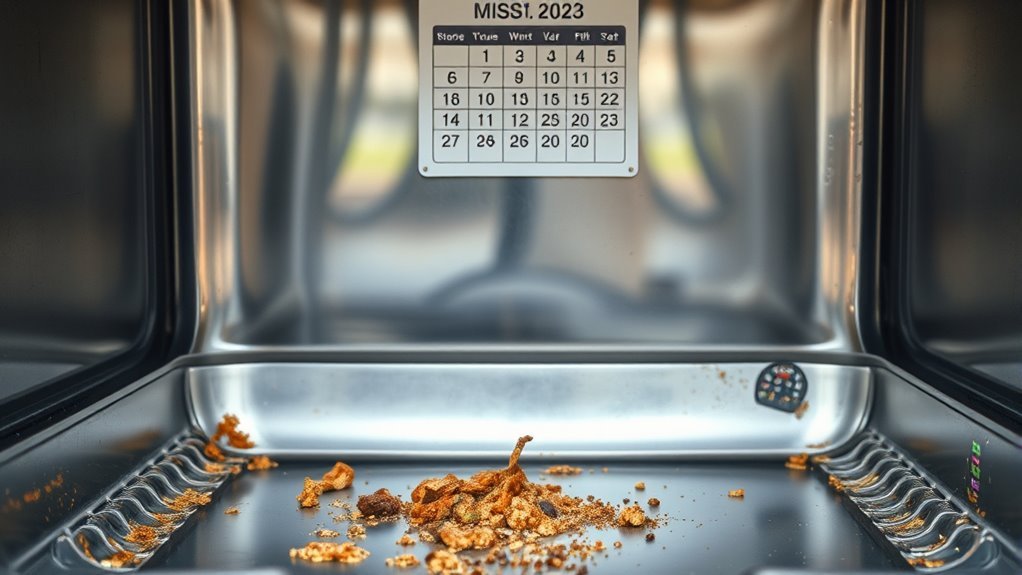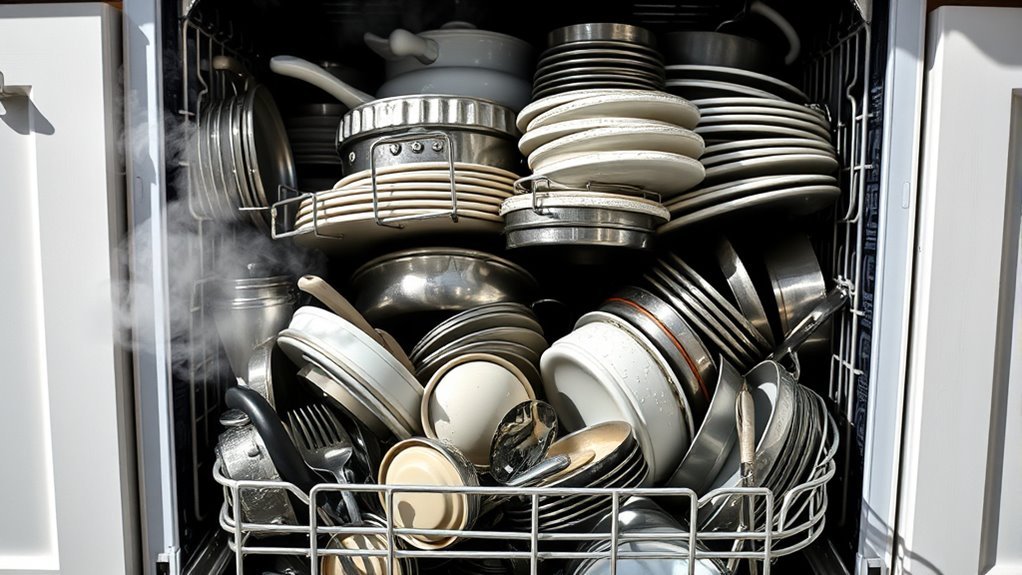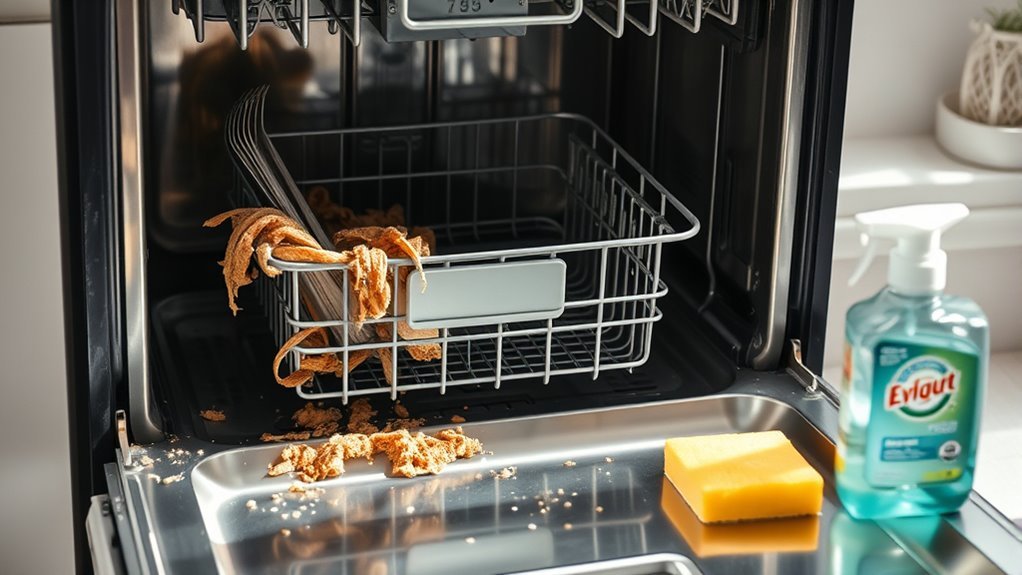Common Mistakes When Cleaning Dishwasher
When cleaning your dishwasher, don’t use harsh chemicals that can wear down seals and plastic parts. Make sure to clean the filter and drain regularly to avoid clogs and odors. Avoid overusing detergent, as it leaves residue and clogs spray arms. Don’t forget door seals and gaskets—they need routine care to prevent leaks. Also, address hard water deposits to keep your dishwasher running smoothly. If you want to keep your appliance efficient and spotless, there’s more essential advice ahead.
Using Harsh Chemicals That Damage Dishwasher Components

One common mistake you might make when cleaning your dishwasher is using harsh chemicals that can damage its components. While it’s tempting to grab strong cleaners to speed up the process, these substances often cause more harm than good. Harsh chemicals can corrode seals, wear down plastic parts, and ruin the delicate mechanisms that keep your dishwasher running smoothly. Instead, you want to maintain your freedom by choosing gentle, dishwasher-safe cleaning solutions that protect every component. This way, you avoid costly repairs and keep your appliance working efficiently for years. Remember, preserving your dishwasher’s integrity means steering clear of anything too abrasive or acidic. Treat your machine with care, and it’ll reward you with reliable, trouble-free cleaning every time.
Ignoring the Filter and Drain Area
You might be overlooking the importance of cleaning your dishwasher’s filter and drain area, but neglecting them can cause serious problems. When the filter gets clogged, your dishwasher won’t drain properly and could leave your dishes dirty. Regularly checking and cleaning these parts helps keep your appliance running smoothly and prevents costly repairs.
Filter Maintenance Importance
Although it might seem like a minor task, neglecting the dishwasher’s filter and drain area can lead to poor cleaning performance and unpleasant odors. Regular filter cleaning is crucial to keep your dishwasher running freely and efficiently. Skipping this step can cause trapped food particles to build up, making filter replacement necessary sooner than expected.
| Maintenance Task | Why It Matters |
|---|---|
| Filter Cleaning | Removes debris, prevents clogs |
| Filter Replacement | Restores ideal filtering |
| Drain Area Check | Guarantees water flows smoothly |
Drain Blockage Consequences
Neglecting the filter and drain area doesn’t just reduce cleaning effectiveness—it can cause serious drain blockages. When you skip regular drain maintenance, food particles and debris build up, restricting water flow and leading to clogs. This not only hampers your dishwasher’s performance but can also cause leaks or unpleasant odors, limiting your freedom from constant kitchen chores. Proper blockage prevention means routinely cleaning the filter and drain to keep everything running smoothly. By staying on top of these simple tasks, you avoid costly repairs and downtime, allowing your dishwasher to do its job without interruption. Taking control of drain maintenance gives you peace of mind and lets you enjoy the convenience of a hassle-free, efficient appliance. Don’t let neglect steal your kitchen freedom.
Skipping Regular Cleaning Schedule

You might think skipping regular cleaning won’t cause issues, but it can lead to buildup and bad odors over time. Sticking to a routine helps keep your dishwasher running smoothly and extends its lifespan. Let’s look at some easy tips to help you stay consistent with maintenance.
Importance of Routine Maintenance
When you skip regular cleaning, your dishwasher can quickly lose its efficiency and even develop unpleasant odors. Routine checks are essential to release maintenance benefits that keep your appliance running smoothly and extend its lifespan. By setting a simple maintenance schedule, you gain freedom from costly repairs and enjoy consistently clean dishes.
| Task | Frequency | Benefits |
|---|---|---|
| Clean filter | Weekly | Prevents clogs, odors |
| Inspect spray arms | Monthly | Guarantees thorough cleaning |
| Wipe door seals | Monthly | Avoids mold buildup |
| Run cleaning cycle | Monthly | Removes grease, residue |
| Check detergent dispenser | Quarterly | Maintains proper dosing |
Stick to these routine checks, and your dishwasher will reward you with reliability and fewer headaches.
Consequences of Neglecting Schedule
Although it might seem like a minor inconvenience, skipping your dishwasher’s regular cleaning schedule can quickly lead to clogged filters, foul odors, and poor wash performance. When you ignore the cleaning frequency, debris builds up, making your dishwasher work harder and less efficiently. This not only shortens its lifespan but also forces you to spend more time re-washing dishes, limiting your freedom to enjoy other activities. Without maintenance reminders, it’s easy to forget this essential task, but neglecting it comes with consequences that affect both cleanliness and convenience. Staying on top of your dishwasher’s upkeep guarantees it runs smoothly, saving you from unexpected breakdowns and the frustration of unpleasant smells. Your freedom depends on a simple, consistent routine.
Tips for Consistent Cleaning
Even if it feels tedious, sticking to a regular cleaning schedule is essential to keep your dishwasher running effectively. To enjoy the freedom of a hassle-free kitchen, you need to embrace consistent cleaning habits. Set reminders based on your dishwasher’s usage to maintain ideal cleaning frequency. Skipping this step can lead to buildup, odors, and poor performance, restricting your daily routine. Use effective techniques like wiping down seals, cleaning filters, and running an empty cycle with vinegar or dishwasher cleaner. These simple actions prevent grime and keep your dishwasher fresh without taking up too much time. By prioritizing consistent cleaning, you guarantee your appliance stays reliable, giving you more freedom to focus on what really matters.
Overloading the Dishwasher During Cleaning Cycle

If you cram too many dishes into the dishwasher during the cleaning cycle, you risk preventing water and detergent from reaching all surfaces effectively. Overloading reduces the dishwasher capacity, making it harder for the cleaning process to work as intended. When the dishwasher is packed beyond its limits, water jets can’t circulate freely, compromising cleaning efficiency. You want your dishwasher to do its job well, not struggle under unnecessary weight. Instead, respect the recommended capacity and arrange items so each gets proper exposure to water and detergent. By avoiding overloading, you maintain your dishwasher’s freedom to operate efficiently, ensuring every load comes out spotless without extra effort or wasted energy. Remember, less is often more when it comes to dishwasher cleaning cycles.
Neglecting to Clean the Door Seals and Gaskets
You might overlook cleaning the door seals and gaskets, but they’re critical for keeping your dishwasher airtight. If you don’t clean them regularly, mold and unpleasant odors can build up quickly. Taking a few minutes to wipe these areas can prevent bigger problems down the line.
Importance of Seal Cleaning
Although the door seals and gaskets might seem minor, neglecting to clean them can cause serious issues for your dishwasher. Dirt, grime, and food particles can build up along these seals, compromising their ability to keep water contained during cycles. If you skip regular seal maintenance, you risk leaks that damage your kitchen floor or cause electrical problems. Over time, worn or dirty gaskets may lose their flexibility, forcing you into costly gasket replacement sooner than necessary. Keeping these components clean isn’t just about appearance—it protects your dishwasher’s efficiency and lifespan. So, make seal cleaning a routine part of your dishwasher care to guarantee it runs smoothly and keeps your freedom from unexpected repairs and hassles.
Preventing Mold and Odors
When door seals and gaskets aren’t cleaned regularly, mold and unpleasant odors can quickly develop in your dishwasher. You want freedom from musty smells and the hassle of scrubbing stubborn mold later. Mold prevention starts with wiping down these hidden spots after every few washes. Use a damp cloth or a soft brush with mild soap to reach into crevices where grime and moisture hide. This simple habit keeps your dishwasher fresh and running smoothly. Plus, controlling odor means you won’t have to open your dishwasher to a foul surprise. Don’t overlook these seals—they’re your dishwasher’s first defense against mold buildup and stinky smells. Stay on top of this, and your appliance will thank you with cleaner dishes and fresher air.
Forgetting to Check and Clean Spray Arms
Since the spray arms are responsible for distributing water throughout your dishwasher, neglecting to check and clean them can lead to poor cleaning performance. If you skip spray arm maintenance, clogged holes or buildup can restrict water flow, leaving your dishes dirty and frustrating you. To keep your dishwasher running freely, regularly remove the spray arms and rinse them under warm water. Use a toothpick or small brush to clear any debris blocking the holes. These simple cleaning techniques guarantee water sprays evenly, maximizing your dishwasher’s effectiveness. Don’t let neglect limit the freedom of your appliance’s cleaning power—keeping spray arms clean is key to consistently spotless dishes and a hassle-free kitchen routine.
Using Too Much Dishwasher Detergent
If you use too much dishwasher detergent, you’re likely to see residue on your dishes and inside the machine. Overloading detergent not only leaves detergent residue but can also clog your dishwasher, restricting its freedom to clean effectively. Sticking to dosage guidelines lets your dishwasher shine without waste or damage.
Here’s what happens when you ignore proper detergent amounts:
| What You Want | What You Get Instead |
|---|---|
| Sparkling clean dishes | Filmy detergent residue |
| Smooth dishwasher run | Clogged spray arms |
| Efficient cleaning | Wasted detergent |
Follow the dosage guidelines on your detergent packaging. Freedom means trusting your dishwasher to do the job right without overdoing it. Less is more, and avoiding excess detergent keeps your dishwasher—and your dishes—fresh and free.
Ignoring Hard Water Deposits and Mineral Buildup
Even though you might not notice it right away, ignoring hard water deposits and mineral buildup can seriously harm your dishwasher’s performance. Hard water leaves behind mineral deposits that clog spray arms, filters, and nozzles, reducing water flow and cleaning efficiency. If you don’t address these deposits regularly, your dishwasher will struggle to get your dishes truly clean, and its lifespan could shorten. You want the freedom to rely on your dishwasher without worrying about hidden blockages or poor results. To prevent this, use a dishwasher cleaner specifically designed to dissolve mineral deposits or run a vinegar cycle every month. Tackling hard water buildup keeps your appliance running smoothly and your dishes spotless—saving you time and hassle in the long run. Don’t let mineral deposits hold you back.
Running the Dishwasher Empty Too Often
While it might seem convenient to run your dishwasher empty, doing so too often wastes water and energy without any cleaning benefit. You’re fundamentally using resources without getting anything cleaned, which defeats the purpose of owning a dishwasher that’s designed to optimize dishwasher efficiency. Running empty cycles increases unnecessary water usage, which not only raises your utility bills but also impacts the environment. Instead, wait until you have a full load before starting the dishwasher. This way, you maximize every cycle’s value while minimizing waste. Embracing this simple habit gives you more control over your resources and supports a lifestyle of freedom—free from needless expenses and wasteful practices. Make your dishwasher work smarter, not harder, by avoiding empty runs.
Failing to Inspect and Maintain Dishwasher Racks
Neglecting to inspect and maintain your dishwasher racks can lead to chipped dishes and rusty spots that damage both your dishwasher and your cookware. You want to guarantee proper rack alignment to prevent items from shifting and breaking during cycles. Regularly check for cracks, missing tines, or worn-out coating, which signal it’s time for rack replacement. Maintaining your racks extends your dishwasher’s life and keeps your dishes safe.
| Problem | Cause | Solution |
|---|---|---|
| Chipped Dishes | Misaligned Racks | Adjust rack alignment |
| Rusty Spots | Worn Rack Coating | Apply protective spray |
| Rack Instability | Broken or Missing Tines | Replace damaged rack |
| Dish Damage | Overloaded Racks | Avoid overcrowding |
Stay free from costly repairs by keeping your racks in top shape.
Frequently Asked Questions
Can I Use Vinegar to Clean the Dishwasher Safely?
You can definitely use vinegar for safe cleaning of your dishwasher. Vinegar usage is a natural, effective way to break down grease and remove odors without harsh chemicals. Just pour a cup of white vinegar into a dishwasher-safe container on the top rack and run a hot water cycle. Avoid using vinegar too often, though—it’s acidic and might damage rubber seals over time. This way, you keep your dishwasher fresh and functioning freely.
How Often Should I Replace Dishwasher Detergent?
You should replace your dishwasher detergent based on the detergent types you use and your cleaning frequency. If you clean dishes daily, it’s best to refresh your detergent every month or two to maintain effectiveness. For eco-friendly or powder detergents, check the expiration date since they can lose potency faster. Keeping your detergent fresh guarantees your dishwasher works efficiently, giving you the freedom to enjoy spotless dishes without extra hassle.
Is It Okay to Run the Dishwasher at Night?
Running your dishwasher at night won’t cause a sonic boom, but it might seem that loud nighttime noise disrupts your peace. Luckily, many modern dishwashers are designed to be quieter, so you can enjoy freedom from daytime chores and still save on energy costs. Nighttime energy rates are often lower, meaning you’ll get those sparkling dishes while cutting your electricity bill. Just make sure your dishwasher’s noise level suits your nighttime comfort!
Can Dishwasher Cleaning Affect the Water Heater?
You might wonder if dishwasher cleaning can affect your water heater. Proper dishwasher maintenance actually helps maintain water heater efficiency because a clean dishwasher guarantees water flows smoothly, reducing strain on your heater. When your dishwasher’s clogged or dirty, your water heater works harder, using more energy. So by keeping your dishwasher clean, you’re freeing yourself from unnecessary energy costs and extending your water heater’s lifespan without extra hassle.
Should I Clean the Dishwasher’S Exterior Regularly?
Think of your dishwasher’s exterior like your car’s paint—neglect it, and grime builds up, making it look tired. You should definitely do regular cleaning for exterior maintenance. It keeps your appliance looking fresh and prevents dirt from sneaking inside. Plus, it’s a simple way to extend its life without hassle. With just a quick wipe-down every week or two, you’ll enjoy a cleaner, more inviting kitchen space without feeling tied down.






